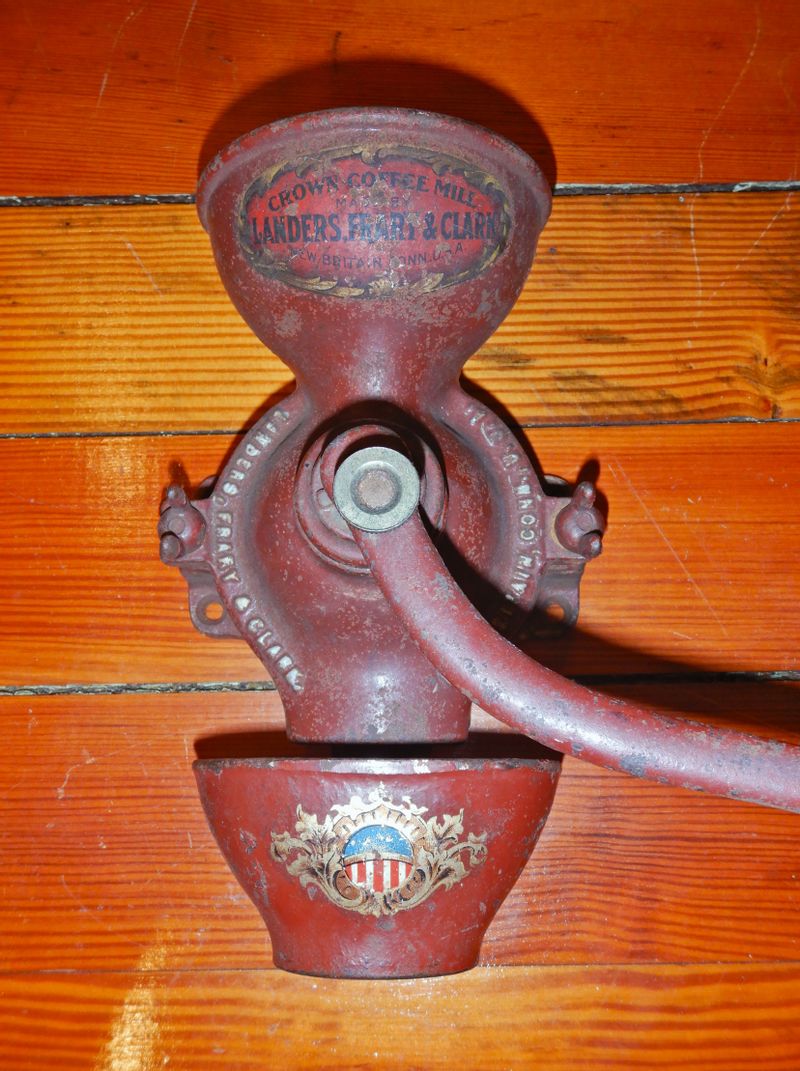Antique Coffee Mills
Last Updated 3/30/2024
By Jubilee P. Reid

Coffee is the world’s second most popular non-water beverage. This global industry has a multi-billion-dollar revenue annually and provides a source of income to millions of people. Approximately 2.25 billion cups of coffee are consumed worldwide every day. Currently, over 75% of people in the U.S. purchase pre-ground coffee beans. However, in the past, roasting and grinding one’s own coffee beans was part of the coffee making process. Coffee grinders have evolved from the mortar and pestle of ancient times to the Bluetooth-enabled machines of today.
The manual coffee mill was invented in 1665 by an Englishman, Nicholas Book. For the price of 40 to 45 shillings, he sold what he claimed was the only grinder specifically designed for coffee. Many models of grinders were patented during the following years including the burr grinder which was invented in 1779 by English blacksmith Richard Dearman. A burr grinder crushes the beans using two revolving coarse surfaces to grind the material in between. This type of mill is used for grinding many food products as well as coffee beans. It spread rapidly throughout the coffee-drinking world.
The first coffee mill patent in the United States was received by Thomas Bruff, Sr. (1770 – 1816) of Maryland in 1798. Bruff was an inventor and dentist to Thomas Jefferson. His coffee mill was a wall-mounted design featuring two circular nuts with teeth. The coffee mill business grew rapidly in New England with many new designs patented and multiple factories built for mill production.
One of the most successful coffee mill manufacturers in late 19th century America was Landers, Frary & Clark of New Britain, Connecticut. This corporation began in 1842 as Dewey & Landers, a company which produced small hardware founded by Josiah Dewey and George Marcellus Landers (1813 – 1895). Landers, Frary & Clark Manufacturing Company was incorporated in 1862 when James Darius Frary (1833 – 1890) joined the firm. The company began producing coffee mills in the 1870s along with many other household devices. In June of 1878, Rodolphus Lovejoy Webb (1830 – 1913), an assignor at Landers, Frary & Clark, acquired a patent for an improved mill design. This grinder included a wooden box with a drawer to collect grounds. Coffee mills of this design were produced by many companies. Landers, Frary & Clark manufactured many models of coffee grinders in the following years including box mills, wall-mounted units, and later electric mills.
In the General Store exhibit of the McMinn County Living Heritage Museum is a coffee grinder made by Landers, Frary & Clark. This model, “001,” is dated to approximately 1915. This cast iron burr grinder is designed to be attached to the wall using four nails and has a detachable bowl for collecting the grounds. Multiple emblems are painted on the dark red background of the mill. The logo on the top of the mill states, “Crown Coffee Mill made by Landers, Frary & Clark New Britain, Conn., U.S.A.” On the detachable bowl is a gold enamel emblem of a flag surrounded by gilded swirls. This mill was used in a home near Boston, Massachusetts before ending up in the ownership of Anne Hornsby of Decatur, TN. She donated it to the museum in 2012.
Throughout the museum are multiple other antique coffee grinders from various manufacturers including an Arcade Crystal wall-mounted mill, designed with a glass container on top to store the unground beans. The cast iron base of this mill has decorative swirls and a wooden handled crank. The Arcade Manufacturing Company was founded in Illinois in 1885 and was a well-known producer of coffee mills. This grinder is their popular No. 3 model which was produced around 1900.
Another mill in the General Store exhibit is a Eureka box mill made in Florence, Italy. Eureka was founded in 1920 by Aurelio Conti and continues to produce quality coffee mills today. This mill was owned by the donor’s family in Tennessee for many years.
According to Business Insider, “After crude oil, coffee is the most sought commodity in the world.” The antique mills in the museum’s collection belong to the history of this amazing little bean.

